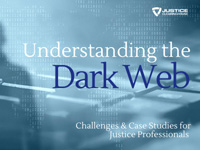
Investigators need to understand the dark side of information sharing and the potential risks it brings to victims, witnesses, and investigators. To avoid potentially dangerous individuals, first responders, security professionals, and intelligence officers choose to keep their families and homes off the grid. Employees and agencies are at greater risk now more than ever because fraudulent predators are taking advantage of those unfamiliar with working from home. Hacking, phishing, and scamming are on the rise,
» Read more

Merriam Webster is our go to source for thousands of definitions. Digital Forensics and Incident Response use terms that are not typically defined in mainstream dictionaries. A quick review of any common list-serve reveals a lexicon of hundreds, if not thousands of unique terms and words. This webinar series will start with the most basic of DFIR definitions and build upon them. Our content will be rooted in empirical facts with a misting of industry history and professional experiences.
» Read more

Criminal activity has always sought to remain hidden from law enforcement. Traditionally, this often meant committing crimes at night, without witnesses, or finding physical ways to disguise or confuse the offender’s identity (e.g. masks, attire, speed). Online environments present new opportunities for criminals, as physical contact is reduced and more daily activity (particularly financial) takes place on the internet. Even then, there is a specific portion of the internet in which there has been significant criminal enterprise – the Dark Web.
» Read more

What is there to know about credit card fraud? Everything! Join us for an interactive presentation discussing the three main types of credit card fraud (Transaction fraud, Identity fraud and Payment fraud). There will be content on cyber fraud, the dark web and how that world operates. We’ll also discuss trends in the industry and how Capital One can assist in your investigations.
Presented by: Jeremy Geisel, National Law Enforcement Strategy Manager,
Capital One Credit Card Division
NW3C does not share Webinar attendees’ personally identifiable information with any third party without opt-in consent given during registration.
» Read more

This webinar is intended for LAW ENFORCEMENT personnel: those who are directly attached to or work in support of a law enforcement agency. Please register using your agency-issued email.
This webinar will be Live Only and will not be available on On-Demand
Registrations will close 24 hours before webinar start time
The presentation will include use cases around searching publicly available information, such as social media, message boards, news, consumer reviews,
» Read more

Though the use of computer forensics in criminal investigations has expanded in recent years, there is limited empirical evidence about the prevalence of the use of digital evidence in the court system and its impact on prosecutorial outcomes. This webinar will discuss how digital evidence has performed in the US. Courts of Appeal, and how the U.S. Courts of Appeal generally views the science behind computer forensics. Participants will understand: (1) the most common legal basis for appeals related to digital evidence,
» Read more

This webinar will examine law enforcement agency cybersecurity challenges resulting from the cyber threats faced by municipalities, counties, and state governments. The webinar will explore how a cyber incident for a law enforcement agency can impact (even lose) a criminal case for the prosecution or negatively impact the agency’s credibility in general. When providing agency cybersecurity, not all postures and solutions are the same.
Presented by:
Carter Schoenberg, Executive Vice President of Cybersecurity Solutions at IPKeys Power Partners
NW3C does not share Webinar attendees’ personally identifiable information with any third party without opt-in consent given during registration.
» Read more

Cell phones are a way of life in modern society. While these devices are used daily for normal communication purposes, they are used for criminal purposes. They are stolen, used to plan crimes, research crimes, and take images of unlawful activities then discarded. Law Enforcement’s ability to recover/obtain these discarded phones can be crucial to a variety of investigations.
Presented by:
Doug Muldoon, Director of Law Enforcement Relations, eco ATM
Jim Smith,
» Read more

Policing has experienced several eras since the inception of professional law enforcement in America. In the 1980’s we moved into a community policing/problem solving era. In the aftermath of 9/11/2001, law enforcement became more militarized. The current COVID-19 pandemic has already radically changed the American landscape, and altered the ways we look at air travel, public gatherings, and personal safety. Law enforcement was already facing significant challenges from the advent of vehicular automation, and funding for basic government services is under threat due to sustained changes in buying patterns,
» Read more

Covid-19 and stay at home orders have impacted criminal investigations, creating a significant backlog and an overwhelming task for investigators. As businesses and life reopen in a post Corona world these investigations will need to be investigated. The sheer volume of backlog will make it difficult for investigators to manage the amount of investigations effectively. This webinar will go over strategies for efficiently managing, triaging and prioritizing investigations. We will discuss various methods and techniques to utilize in dealing with a significant case load and delve into some virtual investigative techniques that can be utilized in the future.
» Read more















